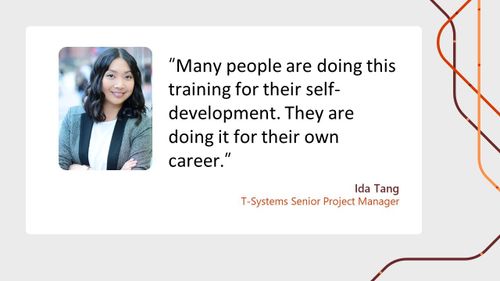24 March, 2022 10:25
Deutsche Telekom (Telekom) set itself an existential learning challenge in late 2020: Telekom Chief Executive Officer (CEO) Tim Höttges and Microsoft CEO Satya Nadella announced that much of Telekom’s internal IT workloads would migrate to the public cloud by 2025. In partnership with Microsoft, Azure is a central part of that strategy.
To meet this challenge, Telekom has undertaken a training program to upskill thousands of its employees in Azure technologies. These new skills serve internal needs at Telekom and benefit Telekom’s enterprise customers worldwide, such as those supported by its IT services subsidiary, T-Systems.
As a critical component of the partnership, Microsoft Learn has provided Telekom with a rich array of learning resources, ranging from introductory content to deep technical training—including online courses, instructor-led training, exam preparation, and certifications—all of which are available to Telekom employees through the company’s intranet and learning management system.
The result? In a little more than a year, nearly 8,000 Telekom employees have been trained and over 2,700 have earned one or more Microsoft Certifications as part of a company-wide learning journey that continues today. The success of the initial skilling program and interest among employees has led to the expansion of the offerings to include security, Microsoft Power Platform, Dynamics 365, and Microsoft 365 solutions.
Skilling up employees, growing a learning culture, and empowering individuals
Getting employees skilled up on key technologies has proven to support Telekom’s strategic goals—both external and internal.
External customers ask specifically about the capabilities of Telekom personnel, including those from T-Systems. Telekom’s skilling journey, as tracked in certifications, helps the company win business. “[Customers] come to me and ask, do we have certifications? How many do we have?” explains T-Systems Senior Project Manager Ida Tang. “It’s crucial to show our clients that we have enough skilled people and certifications.”
Internally, the initiative grew a culture of learning within Deutsche Telekom as employees took more ownership for their own training. “There was a huge demand (from employees) for skilling,” recalls Stephan Baumann, T-Systems VP Chapter Microsoft and Office 365 / DTAG Lead Partner Manager Microsoft. And as employees gain expertise, they contribute to the knowledge of their work groups. “Nearly eight thousand people have been trained, but there are even much more. We probably don’t even know [how many].” He adds, “They are motivated by themselves, without being forced or told to learn new things.”
Oliver Wollerman, a cloud architect at T-Systems, observes that the array of resources made available on the company’s intranet helps employees like him discover content that can grow skills and help them to execute on client engagements. “The portal is such a great tool to catch new technologies,” he says. He cites training and documentation for deep learning, labs where he can test ideas, and exam prep to gauge mastery of a topic (and to help improve the exam pass rate).
With earned certifications come valued credentials and a critical sense of individual accomplishment—key to the learning culture at Telekom—promoting employee satisfaction and retention. “Many people are doing this training for their self-development. They are doing it for their own career,” Ida observes.
Stephan explains that employees receive external validation that they’re continuously developing marketable skills. “You are getting quotes from headhunters twice a day,” he points out. “You also get appreciation from your current employer.” With respect to the Azure team at T-Systems, Stephan believes that the initiative has helped provide stability and consistency. “Guess how many [team members] I lost in the last two years? Not a single one. So maybe that’s also expressing how well that works. That’s awesome!”
Skilling and the future
The strategic partnership with Microsoft and the learning initiative that accompanied it helped Telekom build a skilling journey for employees and a culture of learning for the company. It provides the market with compelling evidence of expertise and ability to execute. Employees are continuous, agile learners, motivated and aligned with the company’s strategic goals.
And the change is ongoing. “It won’t stop,” Ida concludes. “Next year and the following years, it will be more and more important.”
Stephan concurs, and he points out the fundamental reasons that this sort of initiative can work for other organizations. “It was just open-minded thinking,” as he sees it. “Be open, be flexible, overcome borders, and try to do things in new ways. That was really the way to success here.” In addition to Telekom’s enthusiasm for the learning program, Stephan credits the Microsoft skilling team for its organization and day-to-day execution, observing, “I do not recall a single day where the partnership was not super!”
For more details on Deutsche Telekom’s learning journey, check out the following Microsoft Customer Tech Talks episode.
Explore more learning journeys
‘Choose curiosity, embrace challenges’: A learning culture prepares Unit4 for the future
How Accenture set a new world record in partner skilling
https://techcommunity.microsoft.com/t5/microsoft-learn-blog/be-open-be-flexible-skilling-and-the-learning-culture-at/ba-p/3262744 https://techcommunity.microsoft.com/t5/microsoft-learn-blog/be-open-be-flexible-skilling-and-the-learning-culture-at/ba-p/3262744 2022-03-24 16:15:00Z


